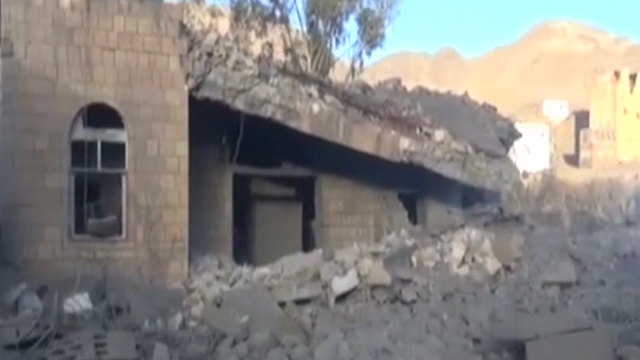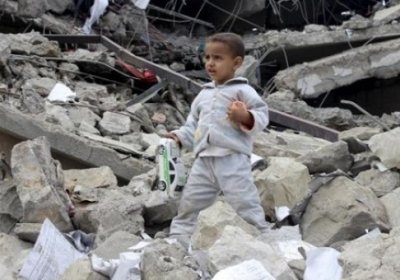Unicef representative in Yemen Meritxell Relano said on March 17 that the death toll from a Saudi air raid two days earlier had reached 119.
The Morning Star said on March 18 that the Saudi strike on Mastaba in the north-western Hajja province also wounded 47 people. The dead include 22 children.
Yemen
French President Francois Hollande awarded his country's most prestigious award, the Legion of Honour, to Saudi Crown Prince Mohammed bin Nayef on March 4 for “countering extremism and fighting terrorism,” the Saudi Press Agency reported.
This understandably received criticism from Human Rights Watch, but its grisly irony passed was largely shrugged off by the Western media and political establishment.
The HRW statement referenced Saudi Arabia's appalling human rights record. But it did not mention the year-long Saudi-led air war in neighbouring Yemen that has killed thousands.
 Aftermath of Saudi bombing of MSF hospital.
The Saudi-led coalition bombed a Doctors Without Borders (MSF) clinic in Yemen, the charity’s mission head said.
The Morning Star said that Hassan Boucenine said two air raids hit the facility in northern Saada province at about 11pm on October 26. “It’s completely destroyed,” he said.
Aftermath of Saudi bombing of MSF hospital.
The Saudi-led coalition bombed a Doctors Without Borders (MSF) clinic in Yemen, the charity’s mission head said.
The Morning Star said that Hassan Boucenine said two air raids hit the facility in northern Saada province at about 11pm on October 26. “It’s completely destroyed,” he said.
Reversing earlier promises to end US military involvement in Afghanistan, President Barack Obama has announced that US troops will remain indefinitely. He said they will not be ground combat forces, but trainers and advisers to the forces of the US-imposed warlord-dominated regime.
US air strikes in support of the regime, by both piloted aircraft and drones, will continue. One such strike was the deliberate bombing of the Doctors Without Borders (MSF) hospital in Kunduz.
Newly leaked United States government documents have provided an unprecedented window into the secret US drone assassination program across the globe.
In “The Drone Papers”, online publication The Intercept reveals drone strikes have resulted from unreliable intelligence, stemming in large part from electronic communications data, or “signals intelligence” (for example, using mobile phone signals to identify people) that officials acknowledge is insufficient.
In Geneva, Switzerland, earlier this month, a range of human rights groups co-sponsored a side event during the 30th session of the United Nations Human Rights Council (UNHRC) addressing “the extensive use of torture and other forms of cruel and degrading treatment in the Saudi criminal justice system”.
 Vendors salvage goods from ruins of their shops following Saudi airs strike.
Civilians and hospitals are being targeted deliberately in Yemen by the Saudi-led Arab coalition airstrikes against the rebels in the country, officials from the Doctors Without Borders (MSF) medical charity said on July 30.
Vendors salvage goods from ruins of their shops following Saudi airs strike.
Civilians and hospitals are being targeted deliberately in Yemen by the Saudi-led Arab coalition airstrikes against the rebels in the country, officials from the Doctors Without Borders (MSF) medical charity said on July 30.
 Child killed by Saudi bombing of Yemen.
Twenty million people in Yemen, the poorest country in the Arab world, are at risk of dying from hunger or thirst. That’s 80% of the country’s population, which, according to UN agencies, badly needs emergency supplies of food and water, along with fuel and medicine.
This almost unimaginable crisis sounds like something out of a disaster movie. But the cause is not an earthquake or a tsunami.
Child killed by Saudi bombing of Yemen.
Twenty million people in Yemen, the poorest country in the Arab world, are at risk of dying from hunger or thirst. That’s 80% of the country’s population, which, according to UN agencies, badly needs emergency supplies of food and water, along with fuel and medicine.
This almost unimaginable crisis sounds like something out of a disaster movie. But the cause is not an earthquake or a tsunami.
Air strikes by the Saudi-led coalition in Yemen killed more than 80 people on May 27, making it the deadliest day since the start of Saudi military operations against the Yemeni rebels two months ago.
The Saudi raids took place near Yemen's border with Saudi Arabia. Residents told Reuters that more than 40 civilians were killed as the coalition's planes failed to target the rebel combatants who were fighting Saudi border soldiers at Bakeel al-Meer area in Hajjah province.
Washington DC was the converging point for some of the world’s most oppressive regimes on May 13 and 14, when President Barack Obama hosted a billionaire conglomerate known as the Gulf Cooperation Council (GCC). The group consists of the Middle Eastern countries of Kuwait, Bahrain, Saudi Arabia, Qatar, UAE and Oman.
The cosy US-GCC relationship exemplifies the twisted nature of US foreign policy, especially in regards to Saudi Arabia. Saudi Arabia has been accused of human rights violations against its own citizens, including political activists, journalists, and women.
Saudi Arabia’s month-long aerial offensive against Yemen resumed on April 22, one day after the Saudi regime announced it was over. Yemen is undergoing a humanitarian crisis, with millions of Yemenis lacking basic access to food, clean drinking water and health care. The Saudi bombardment has only worsened the plight of the Yemenis, with schools destroyed, hospitals and healthcare facilities targetted, and electricity supplies cut off. Basic infrastructure is being shattered, threatening a catastrophic health crisis for Yemeni residents.
The United States is providing crucial support to regional ally Saudi Arabia ― a big buyer of US arms ― as it launches a new war in the Middle East by attacking neighbouring Yemen.
A Saudi-led coalition of Western-aligned, mainly Sunni Islamist, Arab government's launched air, naval and ground military offensive against Yemen on March 25.
Saudi Arabian forces are being supported by military planes from the United Arab Emirates, Qatar, Bahrain, Kuwait, Jordan, Morocco, Sudan and Egypt, which is also supplying naval forces.
- Previous page
- Page 3
- Next page







